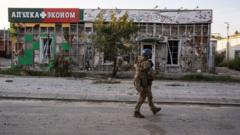In light of President Trump's wavering support, European leaders are gathering to strategize on defense spending and military collaboration, particularly in connection with NATO obligations, at a critical meeting in Brussels.
European Leaders Prioritize Defense Spending Amid Uncertain U.S. Support

European Leaders Prioritize Defense Spending Amid Uncertain U.S. Support
As Trump returns to the White House, European nations convene to address military funding challenges spurred by Russia's aggression in Ukraine.
European leaders are set to meet in Brussels on Monday to discuss the pivotal issues surrounding increased defense spending in response to the ongoing fallout from Russia's invasion of Ukraine, a crisis that began three years ago. The urgency of this dialogue is heightened by uncertainties regarding U.S. support under President Trump's returning administration.
In an unexpected turn, Trump has hinted that he may withdraw American financial and military assistance to Ukraine, prompting EU leaders to explore ways to finance their own defense initiatives more independently. Currently, NATO countries are encouraged to increase their defense budgets to 5% of their GDP, a sharp rise from the organization's existing target of around 3-3.5%. Notably, the U.S. itself allocates approximately 3.4% of its GDP to defense expenditures.
The EU, historically characterized by its commitment to peace and free trade, is now compelled to bolster its military readiness. The bloc's defense strategy pivot has led to discussions on enhancing the efficiency of defense spending and fostering collaborative efforts among member states. British Prime Minister Keir Starmer's attendance marks an important moment, as it signifies the first direct engagement of a British leader with the EU since the Brexit decision.
Central to the negotiations on Monday will be the possibility of using collective debt-raising measures within the EU, akin to the unified financial strategies employed during the Covid pandemic. However, this concept poses challenges, as it might hinder individual NATO members' abilities to meet their existing military expenditure obligations. Out of the 27 EU nations present, 23 are also NATO members, further complicating the financial landscape.
As these discussions unfold, the specter of Trump's leadership and its potential impact on transatlantic relations looms large, making this gathering a critical juncture for European defense strategy.






















